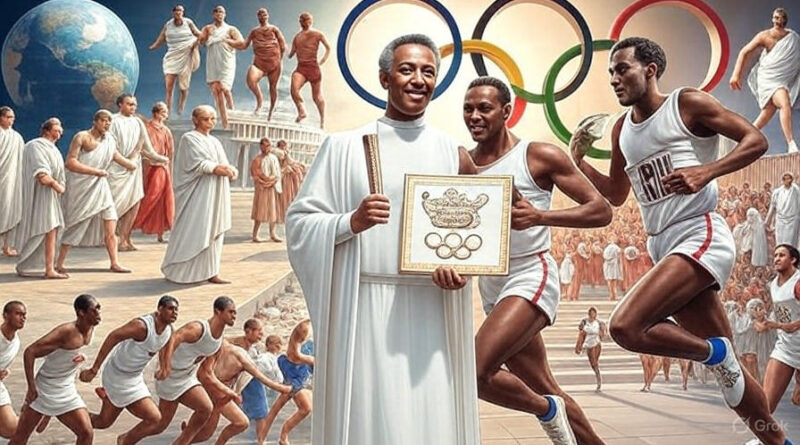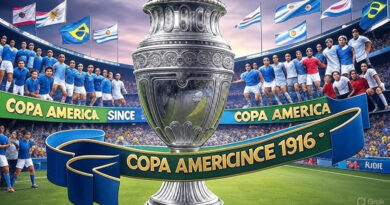Olympic Games: Complete Guide to History, Sports, Records, Paris
Writer : Mohammad Baitullah, DhakaPost Dot Net
Introduction to the Olympic Games
The Olympic Games are the world’s foremost international sporting event, held every four years, where thousands of athletes from across the globe compete in various sports under the banner of peace, unity, and excellence. Organized by the International Olympic Committee (IOC), the Olympics represent not just athletic competition, but also a global celebration of human potential.
Spanning over a century in the modern era—and rooted in ancient history—the Olympics are more than just sports. They symbolize inclusivity, perseverance, discipline, and global cooperation.
The Origin and History of the Olympic Games
Ancient Olympic Games
The roots of the Olympics trace back to ancient Greece in 776 BCE. These early Games were held in Olympia and dedicated to Zeus, the king of the Greek gods. Events included foot races, wrestling, chariot racing, discus throw, and javelin. Only freeborn Greek men could compete, and wars were paused to ensure peace during the Games.
The ancient Olympics continued for nearly 12 centuries until Roman Emperor Theodosius I banned them in 393 CE as part of his effort to promote Christianity.
Revival of the Modern Olympics
After more than 1,500 years, the Olympic spirit was revived by Baron Pierre de Coubertin, a French educator and historian, who believed sports could unite the world. His efforts led to the first modern Olympic Games in Athens, Greece, in 1896, with 14 nations participating in 43 events.
Key Milestones in Olympic History
- 1896 – First modern Olympics in Athens
- 1924 – Introduction of the Winter Olympics (Chamonix, France)
- 1960 – First televised Olympics (Rome)
- 1980 & 1984 – Major boycotts during the Cold War
- 2000 – Inclusion of more women’s events
- 2020 (held in 2021) – First Olympics without spectators due to COVID-19
The Games have expanded from 14 nations and 241 athletes in 1896 to over 200 nations and 11,000+ athletes today.

Olympic Games Format and Structure
Summer vs Winter Olympics
- Summer Olympics: Held every 4 years with sports like athletics, swimming, football, gymnastics, basketball, etc.
- Winter Olympics: Also every 4 years but staggered with the Summer Games. Features snow and ice sports like skiing, ice skating, bobsledding, etc.
Frequency
- Olympics occur every 4 years, alternating between Summer and Winter editions every 2 years.
Qualification
Athletes qualify through various national trials, world championships, and continental qualifiers, depending on the sport. The number of participants is capped based on sport-specific quotas.
Hosting the Games
Cities bid years in advance to host the Olympics. The IOC votes to select the host based on infrastructure, planning, sustainability, and financial readiness.
Olympic Symbols and Traditions
The Olympic Rings
The five rings (blue, yellow, black, green, and red) represent the five continents of the world united by Olympism. Every national flag in the world contains at least one of these colors.
The Olympic Flame
Lit in Olympia, Greece, the flame is carried via a torch relay to the host city. It symbolizes purity, effort, and the connection between the ancient and modern Games.
The Motto
“Citius, Altius, Fortius – Communiter”
(Faster, Higher, Stronger – Together)
Opening and Closing Ceremonies
- Opening Ceremony: A grand celebration showcasing host country culture, athlete parade, and lighting of the flame.
- Closing Ceremony: Medal presentations, artistic performances, and the symbolic handover to the next host.
Full List of Olympic Sports
Summer Olympic Sports (Selected)
- Athletics (Track & Field)
- Swimming & Diving
- Gymnastics
- Football (Soccer)
- Basketball
- Boxing
- Tennis
- Judo & Taekwondo
- Cycling (Road, BMX, Track, Mountain)
- Wrestling
- Equestrian
- Rowing & Canoeing
- Skateboarding, Surfing, and Sport Climbing (recent additions)
Winter Olympic Sports (Selected)
- Alpine Skiing
- Ice Hockey
- Snowboarding
- Figure Skating
- Speed Skating
- Curling
- Luge & Skeleton
- Bobsleigh
- Cross-country Skiing
Top Olympic Medal-Winning Countries
| Rank | Country | Gold | Silver | Bronze | Total |
|---|---|---|---|---|---|
| 1 | United States | 1180 | 960 | 841 | 2981 |
| 2 | Soviet Union† | 473 | 376 | 355 | 1204 |
| 3 | Germany* | 319 | 278 | 300 | 897 |
| 4 | Great Britain | 296 | 321 | 331 | 948 |
| 5 | China | 293 | 224 | 205 | 722 |
† No longer competing; includes USSR
- Includes East and West Germany totals

Legendary Olympic Athletes
Michael Phelps (USA) – Swimming
- 23 Gold, 3 Silver, 2 Bronze = 28 total medals
- Most decorated Olympian in history
Usain Bolt (Jamaica) – Sprinting
- 8 Gold medals
- World record holder in 100m and 200m
Simone Biles (USA) – Gymnastics
- Multiple golds, most decorated gymnast in World/Olympic history
Larisa Latynina (Soviet Union) – Gymnastics
- Held record for most Olympic medals (18) until Phelps broke it
Paris 2024 Olympics – What to Expect
Overview
- Dates: July 26 – August 11, 2024
- Location: Paris, France
- Number of Athletes: ~10,500
- Nations: Over 200
- Venues: Eiffel Tower, Stade de France, Champs-Élysées, Seine River
New Sports
- Breaking (Breakdancing) debut
- Skateboarding, surfing, and sport climbing return
Sustainability Goals
- 95% existing or temporary venues
- Carbon-neutral games
- Emphasis on public transport and renewable energy
Stars to Watch
- Armand Duplantis (pole vault)
- Sydney McLaughlin (hurdles)
- Katie Ledecky (swimming)
- Eliud Kipchoge (marathon)
Olympic Games and Global Impact
- Tourism boost: Millions travel to watch the Games
- Infrastructure development: New roads, stadiums, housing
- Cultural exchange: People from all nations come together peacefully
- Inspiration: Encourages youth participation in sports
- Economic impact: Billions in revenue, job creation, brand exposure
Olympic Controversies and Challenges
- Doping scandals: Russia’s state-sponsored doping scheme
- Boycotts: Cold War-era political boycotts (Moscow 1980, LA 1984)
- Gender discrimination: Fewer events for women historically
- Cost overruns: Sochi 2014 ($51 billion), Tokyo 2020 delays
Future of the Olympic Games
Upcoming Hosts
- Los Angeles 2028 (USA)
- Brisbane 2032 (Australia)
Innovations
- Use of AI, virtual reality, biometric tracking
- Enhanced digital broadcasting and streaming
- Introduction of more inclusive and urban sports
- IOC’s Olympic Agenda 2020+5 focuses on sustainability and youth

1. What are the Olympic Games?
The Olympics are a global multi-sport event held every four years, showcasing the world’s best athletes from over 200 nations.
2. Who founded the modern Olympics?
Baron Pierre de Coubertin, a Frenchman, revived the Games in 1896 to promote peace through sport.
3. How often are the Olympics held?
Every four years. Summer and Winter Olympics alternate every two years.
4. What is the Olympic motto?
“Citius, Altius, Fortius – Communiter” meaning “Faster, Higher, Stronger – Together”.
5. What do the Olympic rings represent?
The five inhabited continents united through sport.
6. Which country has the most Olympic medals?
The United States leads with nearly 3,000 medals.
7. Who is the most decorated Olympian?
Michael Phelps with 28 medals, including 23 gold.
8. What sports are in the Olympics?
Over 30 sports, including athletics, swimming, gymnastics, football, cycling, and newer additions like skateboarding.
9. What is the Olympic flame?
A symbolic flame lit in Greece and carried to the host city via a torch relay.
10. How can fans watch the Olympics?
Through official broadcasters like NBC, BBC, Eurosport, and streaming platforms.
11. What is the Youth Olympic Games?
A version of the Olympics for athletes aged 14–18, held every 4 years.
12. How is the Olympic host city selected?
Through a bidding and voting process by the IOC.
13. What are demonstration sports?
Sports showcased during the Games for potential future inclusion.
14. What are the biggest controversies?
Doping scandals (Russia), boycotts, and financial mismanagement in host cities.
15. When and where is the next Olympics?
Paris 2024 (Summer) and Milan-Cortina 2026 (Winter).
Conclusion of Olympic Games
The Olympic Games are more than just a global sports festival—they are a powerful symbol of unity, peace, and human excellence. With over a century of modern history and roots tracing back to ancient Greece, the Olympics continue to inspire billions through breathtaking performances and stories of triumph.
As we look forward to Paris 2024 and beyond, the Olympic spirit promises to bring the world together once again to celebrate what’s best in humanity.
Want to stay updated on Olympic news, athlete stories, and Paris 2024 previews? Bookmark this page and subscribe to official updates at https://olympics.com
Here are 20 important historical milestones and facts about the Olympic Games, covering both ancient and modern eras:
🏛️ Ancient Olympic Games
- First Ancient Olympics (776 BCE)
The first recorded Olympic Games were held in Olympia, Greece, dedicated to Zeus, with only one event: the stadion footrace. - Only Freeborn Greek Men Could Compete
Women, slaves, and foreigners were not allowed. Married women were even barred from attending as spectators. - Events Expanded Over Time
Later editions included wrestling, boxing, chariot racing, the pentathlon, and more. - The Olympic Truce (Ekecheiria)
During the Games, all wars between Greek city-states were suspended to ensure safe passage for athletes and spectators. - End of Ancient Olympics (393 CE)
The Roman Emperor Theodosius I banned all pagan festivals, including the Olympics, marking the end of the ancient Games.
🔄 Transition to Modern Olympic games
- Revival by Pierre de Coubertin (1894)
The French educator proposed the revival of the Olympics to promote peace through sports. The International Olympic Committee (IOC) was established. - First Modern Olympics (1896, Athens)
Featuring 14 countries and 241 athletes, the modern Olympic movement officially began with athletics, swimming, gymnastics, and more. - First Female Olympic Participants (1900, Paris)
Women were allowed to compete for the first time in events like tennis and golf. - First Winter Olympics (1924, Chamonix)
Winter sports like skiing, ice hockey, and figure skating were included in a separate Olympic edition. - Nazi Propaganda Olympics (1936, Berlin)
Hitler used the Games for propaganda, but Jesse Owens, an African-American athlete, won 4 gold medals, challenging Nazi racial ideology.
🌐 Modern Olympic Games Milestones
- Olympics Cancelled Due to Wars
The Games were cancelled in 1916 (WWI), and 1940 and 1944 (WWII). - Olympic Torch Relay Introduced (1936)
The idea of carrying the Olympic flame from Olympia to the host city began in Berlin 1936 and continues as a tradition. - Televised Olympics Begin (1960, Rome)
The first Games broadcast live on TV, making the Olympics a truly global spectacle. - Black Power Salute (1968, Mexico City)
American sprinters Tommie Smith and John Carlos raised their fists in protest against racial injustice, creating one of the most iconic Olympic images. - Munich Massacre (1972)
11 Israeli athletes were killed by terrorists during the Munich Olympics, leading to overhauls in Olympic security.
🏅 Expansion and Inclusion of Olympic Games
- Title IX and Women’s Growth in Olympics
Title IX in the U.S. (1972) fueled increased participation of women in sports, mirrored by growing female events in the Olympics. - Professional Athletes Allowed (1992)
The “Dream Team” of NBA stars (USA Basketball) debuted in Barcelona 1992 after the IOC allowed professionals. - Refugee Olympic Team (2016, Rio)
For the first time, a team of athletes without a country competed under the Olympic flag, highlighting the refugee crisis. - Tokyo 2020 Held in 2021
Due to the COVID-19 pandemic, the Games were postponed for the first time in history and held without international spectators. - Paris 2024 to Introduce Breaking (Breakdancing)
As part of youth-focused urban sports, breakdancing debuts, alongside returning additions like skateboarding and surfing.
few humorous moments from Olympic games history:
- Eddie the Eagle (1988 Calgary Winter Olympics) – Michael Edwards, a British ski jumper with no formal training, became a fan favorite despite finishing last. His wobbly jumps and infectious enthusiasm earned him the nickname “Eddie the Eagle,” turning a lackluster performance into a lovable legend.
- The Jamaican Bobsled Team (1988 Calgary Winter Olympics) – Inspired by “Cool Runnings,” this unlikely team from a tropical island crashed spectacularly but finished the race with style, pushing their sled across the finish line to a roaring crowd.
- Eric “the Eel” Moussambani (2000 Sydney Olympics) – This swimmer from Equatorial Guinea, with minimal training, took nearly twice as long as his competitors in the 100m freestyle. His doggy-paddle finish had the audience cheering wildly for his sheer determination.
- The Mascot Mishap (2010 Vancouver Winter Olympics) – During the opening ceremony, one of the giant mechanical mascots malfunctioned and got stuck mid-performance, leaving technicians scrambling while the show awkwardly continued.
These quirky moments remind us that the Olympics are as much about heart and humor as they are about winning!
1. Munich Massacre (1972 Munich Summer Olympic games )
The 1972 Munich Olympics turned tragic when Palestinian terrorists from the Black September group attacked the Israeli team’s quarters. On September 5, the attackers took 11 Israeli athletes and coaches hostage, demanding the release of Palestinian prisoners. The 20-hour standoff ended in a botched rescue attempt at the airport, where all hostages, five terrorists, and one German policeman were killed. The Games paused briefly to mourn, casting a dark shadow over the event and highlighting the vulnerability of international unity.
2. Ben Johnson’s Disqualification (1988 Seoul Summer Olympic Games)
Canadian sprinter Ben Johnson shocked the world by winning the 100m final in a world-record time of 9.79 seconds, only to have his gold medal stripped days later. After testing positive for stanozolol, an anabolic steroid, Johnson was disqualified, and the title was awarded to Carl Lewis. The scandal not only ended Johnson’s career but also sparked a global conversation about doping, leaving fans heartbroken over the betrayal of Olympic ideals.
3. Derek Redmond’s Injury (1992 Barcelona Summer Olympic Games)
British runner Derek Redmond was a favorite in the 400m semifinal when he tore his hamstring mid-race. Determined to finish, he hobbled forward in agony, supported by his father, Jim, who ran onto the track to help. Despite being disqualified for the assistance, their emotional embrace at the finish line moved the crowd to tears, symbolizing perseverance amid devastating injury.
4. The Tlatelolco Massacre Aftermath (1968 Mexico City Summer Olympic Games)
The 1968 Olympics were marred by the Tlatelolco Massacre just 10 days before the Games began. On October 2, Mexican military forces opened fire on student protesters in Mexico City, killing hundreds. The Olympics proceeded amid international criticism, with athletes and spectators grieving the loss of life and the suppression of peaceful dissent, tainting the event’s spirit.
5. Florence Griffith Joyner’s Sudden Death (Post-1988 Seoul Olympic Games)
Florence Griffith Joyner, known as “Flo-Jo,” dazzled the 1988 Seoul Olympics with three gold medals and world records in the 100m and 200m. Her sudden death in 1998 at age 38 from an epileptic seizure left the track world in mourning. Speculation about performance-enhancing drugs added to the sadness, overshadowing her incredible achievements.
6. The Soviet Boycott (1984 Los Angeles Summer Olympics)
In retaliation to the U.S.-led boycott of the 1980 Moscow Olympics, the Soviet Union and 14 Eastern Bloc countries boycotted the 1984 Los Angeles Games. This political tit-for-tat deprived athletes of competition and robbed fans of legendary matchups, leaving a sense of loss for the global unity the Olympics strive to represent.
7. Pietri Dorando’s Disqualification (1908 London Summer Olympics)
Italian marathon runner Dorando Pietri collapsed multiple times near the finish line of the 1908 Olympic marathon due to exhaustion and dehydration. Officials helped him cross, but he was disqualified for assistance, handing the gold to American Johnny Hayes. The dramatic scene, captured on film, left spectators heartbroken for Pietri’s valiant but unsupported effort.
8. The Zola Budd-Mary Decker Collision (1984 Los Angeles Summer Olympics)
In the 3000m final, British runner Zola Budd, running barefoot, accidentally collided with American favorite Mary Decker, causing Decker to fall and withdraw in tears. The incident sparked controversy and blame, with Decker’s emotional exit leaving fans and fellow athletes saddened by the loss of a potential classic race.
9. The Death of Nodar Kumaritashvili (2010 Vancouver Winter Olympics)
Georgian luger Nodar Kumaritashvili died hours before the 2010 Vancouver Winter Olympics opening ceremony after crashing at 143 km/h during a training run on the treacherous Whistler track. The 21-year-old’s death led to track modifications and a somber mood, with his teammates carrying his name in the parade of nations, honoring his memory.
10. The Exclusion of South African Athletes (1964-1988)
Due to apartheid, South Africa was banned from the Olympics from 1964 to 1992, preventing its athletes from competing on the world stage. This exclusion, while a stand against racial injustice, left talented individuals sidelined and the Olympic community diminished, with the eventual reintegration in 1992 marked by both joy and lingering sorrow for lost years.
These moments reflect the profound human and political challenges that have shaped Olympic history, blending triumph with tragedy.



